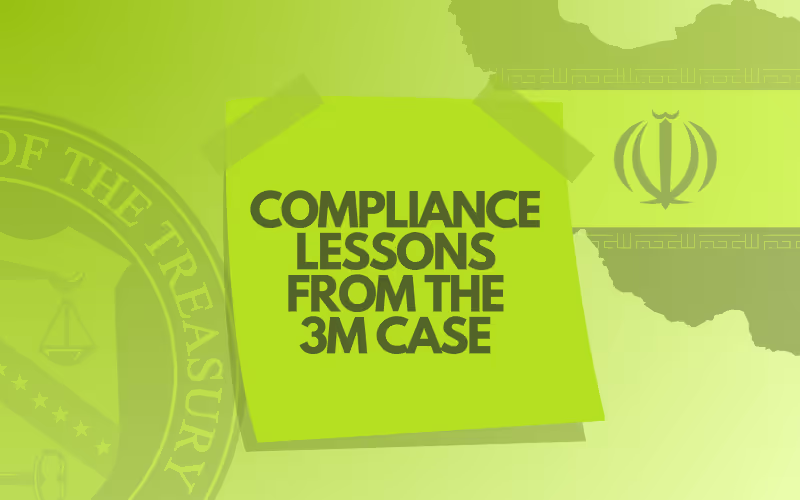
OFAC Slaps 3M With $9.6 Million Iran Sanctions Fine: Compliance Lessons
In yet another multi-million dollar penalty dished out by OFAC in 2023, 3M is the latest corporation to be stung with a hefty fine for sanctions violations. So what went wrong? And what lessons can sanctions compliance professionals learn from the case? Read on because this article will reveal key takeaways from the settlement.
But before we reveal the learning points, let's take a closer look at the case.
3M's 2023 OFAC Penalty: Here's What Happened
3M is widely known for inventing something we all know: Magical pieces of yellow paper that can stick to almost anything. But something the Minnesota-based US conglomerate hasn't stuck to in recent years is US sanctions against Iran.
On September 21, 2023, the US Office of Foreign Assets Control (OFAC) published an Enforcement Release announcing that it had settled with 3M for $9,618,477 for apparent violations of the Iranian Transactions and Sanctions Regulations.
At the crux of the penalty is this: Between 2016 and 2018, 3M's subsidiaries in Switzerland (3M East) and the UAE (3M Gulf) were involved in entering a process that ultimately led to the company selling reflective license plate sheeting via a German reseller to Bonyad Taavon Naja, an entity controlled by Iran's law enforcement forces.
OFAC also revealed that the 3M subsidiaries knew the ultimate end user. And even after external due diligence consultants flagged potential Iran sanctions violations to 3M, the sales still went through. A crucial facet of the case is how several 3M employees (including a US person) were "reckless" and broke US sanctions laws, according to the Enforcement Release.
For example, although a group of 3M employees knew who the end user was (an entity controlled by Iran's law enforcement forces), this critical information was purposefully omitted when information regarding the sale was sent to 3M's Trade Compliance counsel in Minnesota for sanctions screening.
The consequence? Only the German reseller was screened and not the Iranian end-user.
Compliance Lessons From OFAC's Settlement With 3M
Now that we understand the case's general outline, let's dive into the sanctions compliance lessons.
And remember, as regular readers of the sanctions.io blog will already know, OFAC does a fantastic job at breaking down penalties, so professionals can extract as much helpful information as possible. The 3M settlement document is a five-page PDF and worth a read.
But, in no order of importance, here are the key takeaways and lessons that you should know:
Lesson 1: Subsidiaries Continue To Pose Elevated Sanctions Violation Risk
In 2023, a prevailing pattern in sanctions violation penalties is emerging stronger than ever: Foreign subsidiaries of companies operating in multiple jurisdictions pose an elevated risk for sanctions violations.
In sanctions.io's analysis of penalties slapped on Microsoft, British American Tobacco (BAT), Swedbank, and now 3M, employees at subsidiaries have acted against US sanctions laws.
The result? The parent company has been left to clear up the legal mess, the astronomical financial bill, and the severe reputational damage. And it's a message that OFAC hammers home in its 3M Enforcement Release. This is what they said:
"Parent companies are expected to oversee compliance with applicable US sanctions laws within their subsidiaries and to empower employees to alert headquarters."
The above text should not be taken lightly. After all, some of the most significant sanction violations and penalties in 2023 involve subsidiaries.
OFAC also alludes to the importance of:
- Implementing robust employee training programs
- Effectively managing relationships in high-risk jurisdictions
It's also vital to remember that while a subsidiary may be situated in a standard sanctions-risk country, it may still have close cultural and business ties with a high-risk country - something that might not always be immediately evident.
This represents a potential vulnerability in sanctions compliance that also requires careful management.
Lesson 2: Voluntary Self-Disclosure Is More Important Than Ever
All government agencies responsible for enforcing sanctions laws, such as OFAC in the US and the Office of Financial Sanctions Implementation (OFSI) in the UK, have voluntary self-disclosure (VSD) programs.
They are vitally important because it's a process that allows businesses and organizations to disclose a potential sanctions violation voluntarily.
But guess what?
In 2023, especially in the US, voluntary self-disclosure is more important than ever. Why? You can read all about it in the following sanctions.io blog post: Voluntary Self-Disclosure in the US Is Changing: What It Means for Sanctions Compliance
But in essence, the US government is doubling down on the "carrot and the stick" approach to voluntary self-disclosure. And the carrot for sanctions compliance is this: Greater incentives for organizations to submit a voluntary self-disclosure to OFAC. And let's turn our attention back to the 3M case. In OFAC's Enforcement Release, a mitigating factor (resulting in a lesser overall punishment) was:
"3M voluntarily self-disclosed the Apparent Violations to OFAC and provided substantial cooperation throughout OFAC's investigation."
Lesson 3: Sanctions Enforcers Expect Remedial Action To Be Taken Seriously
The previous section noted that mitigating factors helped 3M receive a less severe penalty. Another one, according to OFAC, is that the Minnesota-based company performed a thorough investigation and took remedial measures in response to its investigation's findings.
Here are some of the actions 3M took:
- Sacked and reprimanded employees
- Added trade compliance counsel capabilities
- Introduced Enhanced Due Diligence measures (e.g., additional sanctions screening)
- Boosted trade compliance training
In this case, 3M helped itself by diligently committing to corrective measures prescribed by OFAC.
But it's worth remembering that not all companies take remedial actions as seriously or proactively, perhaps due to poor compliance cultures (another 2023 trend in sanctions penalties).
For example, in July 2023, Deutsche Bank received a jaw-dropping $186 million sanctions and AML penalty from the US Federal Reserve Board (the Fed). Why? Because the Frankfurt-based bank failed to make sufficient progress after the Fed and the New York State Department of Financial Services levied more than $300 million in penalties on the company between 2015-2017.
Further Breakdowns of Sanctions Violation Penalties
This article is part of a series of reports revealing insights from recent sanctions and AML violations in 2023. Here are more from the blog:
- OFAC Penalizes Building Materials Firm in Iran Sanctions Case: Insights for Compliance Pros
- Key Takeaways From Deutsche Bank's $186 Million Sanctions and AML Penalty
- Microsoft's 2023 Sanctions Penalties: 5 Key Learning Points
- Learning From BAT's $635M North Korea Sanctions Fine: 5 Key Insights
- Unravelling Swedbank's $3.4 million OFAC Sanctions Penalty: 3 Key Insights
How sanctions.io Supports Sanctions Compliance
sanctions.io is a highly reliable and cost-effective solution for sanction checking. AI-powered and with an enterprise-grade API with 99.99% uptime are reasons why customers globally trust us with their sanctions screening needs.
To learn more about how our sanctions, PEP, and criminal watchlist screening service can support your organization's compliance program:
7-Day Free Trial (No Credit Card Required)
We offer a free 7-day trial (no credit card is required) and will be delighted to walk you through our service.



